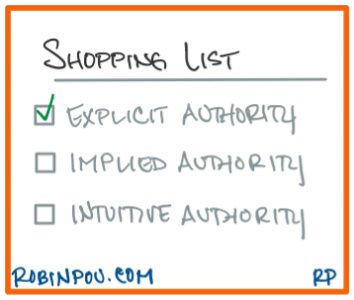You Have Authority (#63)

Leadership is a dangerous game right now. High stakes. Numerous challenges. Vocal onlookers. Slim margin for error. All of this leaves the leader wondering what authority they have and whether they can make an impact.
>
“A genuine leader is not a searcher for consensus but a molder of consensus.”
This Week’s Edition
Authority is the power to influence or direct people’s thinking, opinions, or behavior. On what authority are you basing your leadership during turbulent times?
Clarify Your Thinking
Based on disruptive markets, leaders are questioning their authority to lead, which sounds like this:
· Isn’t that leadership move out of bounds or off limits?
· I’m not sure how they will respond if I do that.
Breaking news: You are the leader. You have authority. Use it!
“Robin, what’s my true authority and how do I best use it?” Chris said.
“Let’s explore that,” I said, “because leaders who are unclear about their authority often suffer doubt about their next strategic move.”
There are three types of authority.
Explicit Authority is granted by the person who hired you. It comes with the position. Leaders unsure of their explicit authority will either avoid opportunities to influence others thereby limiting their authority or take too much authority effectively running afoul of their leadership bounds.
Implied Authority is conferred by consensus of others based on your personal relationships that exist organically in your sphere of influence. You have authority based on their consent. Leaders unsure of their implied authority question the quality of their relationship with their team.
Intuitive Authority is authority which resides within you based on your experience and expertise. You know what to do based on your gut instinct. Leaders unsure of this type of authority question themselves.
Thoughts Lead to Actions
If you question your leadership authority, take the following steps to define your authority and stand confidently on your leadership decisions.
1. Ask your boss: “What actual authority do I have? What are your expectations of me as a leader?” (Clarify your explicit authority).
2. Ask your team: “How do you like to be led? What are your expectations of me as a leader?” (Clarify your implied authority).
3. List your leadership strengths. Define your leadership style. Remember your leadership experiences and enumerate your hard-fought leadership wisdom. (Boost your intuitive authority).
You have explicit, implied and intuitive authority. Recognizing the three types of authority is the first step. The second step is knowing that leadership is situational and that you may need to use a different type of authority for each situation. Through practice, you will learn which authority is best for which situation.
Boost Your Performance
Leaders who question their authority will often be less than effective at holding their team accountable. This week’s video showcases how to effectively use your leadership authority to support your team by holding them accountable for the success they desire.
What’s Your Opinion?
Which of the three types of authority are you most comfortable using? Share it with me at robin.pou@robinpou.com.
Don’t let doubt count you out. Have a confident week!
Robin Pou, Chief Advisor and Strategist
If this was helpful, feel free to share it with another leader who needs to defeat doubt and complete their confidence.
Let’s Connect
Follow me on Linkedin, Facebook and Twitter.
What is “The Confident Leader”?
During the Covid-19 Pandemic, I began a video series called “Panic or Plan?” It was designed to equip leaders to navigate the doubt they experienced and to rise in the confidence they needed to lead during turbulent times. It took off. I then started this newsletter to equip leaders in the same fashion each week for the doubt that crashes across the bow of their leaderSHIP.
welcome to the club! I see you.
- Step out of Doubt
- Complete your Confidence
- Tackle any leadership challenge




